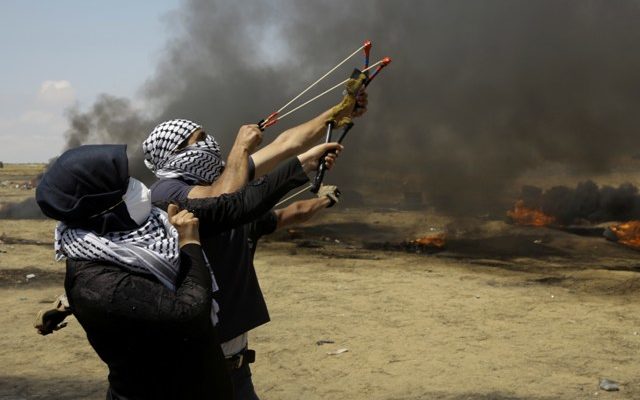Hamas chief Yahya Sinwar admits Gaza’s weekly March of Return was staged to divert pressure to Israel. Why is Hamas feeling the heat?
By: Daniel Krygier, World Israel News
The weekly “March of Return” protests on the Gaza-Israel border have largely been blamed on Israel and the move of the US embassy to Israel’s capital, Jerusalem. However, as is frequently the case with Gaza, there is more than meets the eye.
Hamas terror chief Yahya Sinwar recently admitted that the violent border clashes were staged to divert pressure to Israel.
Addressing a Hamas conference in Gaza, Sinwar said, “After the reconciliation efforts (between Hamas and Fatah) reached an impasse, a number of factions planned to cause an internal explosion in the Gaza Strip, but the Marches of Return thwarted the plan.”
International media has ignored this candid admission by the Hamas leader.
What pressure did Hamas feel the need to divert to Israel? What are the deeper driving forces behind Gaza’s seemingly chronic state of crisis?
The division between Hamas-ruled Gaza and Fatah-ruled Ramallah have not only complicated prospects for Arab-Israeli peace negotiations. They have divided the Arab populations to the point where they today effectively constitute two different political entities.
There is no love lost between Hamas and Fatah. While most Gazans voted for Hamas in the 2006 election, years of rampant poverty and autocratic Islamist rule in Gaza have left most of the population in dire straits. Since most of the international aid goes to Fatah, reconciliation between Hamas and its Ramallah-based rival has been a priority for many Gaza residents.
However, Fatah has demanded that Hamas disarm and hand power over Gaza to Fatah. Unsurprisingly Hamas has refused to disarm and is no hurry to let go of its Islamist-ruled kingdom on the Mediterranean shore.
In other words, the Hamas leadership prioritizes its power and influence over the wellbeing of ordinary Gazans.
While Gazans are by no means Zionists, the harsh reality of Islamist rule has increased opposition to Hamas. Like many other despotic regimes in the past, Hamas chooses the Jews and Israel’s military blockade of Gaza as convenient scapegoats for the self-inflicted socio-economic problems in Gaza.
Israel’s blockade is designed to prevent Hamas from smuggling weapons that are later used against Israel, although the Jewish state has continuously let humanitarian aid into the Gaza Strip. However, the lack of concern for Gazans by Hamas has been demonstrated on multiple occasions when Gaza’s Islamist rulers refused to accept humanitarian aid from Israel into the Strip.
Hamas needs chronic crisis and conflict in order to justify its existence. Genuine peace with Israel and progress in Gaza would put the terror group out of business. At the same time, continued Hamas rule depends on controlling the crisis and not allowing it to get out of control.
Hamas is fully aware of the fact that blaming Israel is never far away from the minds of many international journalists. In this context, excess rage directed against Hamas rule is therefore conveniently diverted to the Jewish state. In other words, the Gaza border riots against Israel were staged by Hamas to perpetuate its rule over Gaza.





